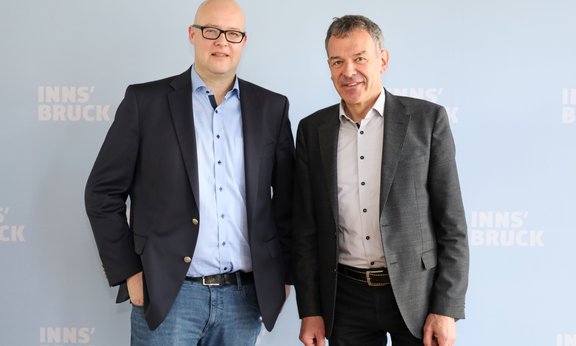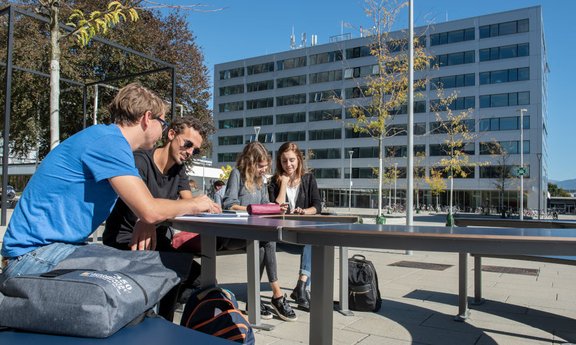Master’s Programme Organization Studies
You want to understand complex processes in organisations and shape them in a socially responsible way and develop them further through creative impulses?
The students in the Master's Degree Programme in Organization Studies acquire a deeper knowledge of organisations and organising. Based on an interdisciplinary and social scientific approach the programme is internationally oriented and values openness towards other ways of thinking and living.
As reflective practitioners the graduates of this programme will manage complex organisational situations in a socially responsible and creative way.
Study Code
UC 066 972
Application
It is recommended to commence the programme in the winter semester in order to avoid study delays.
FAQ
Graduates possess highly specialized knowledge for the analysis and development of processes and structures in organizations. They possess knowledge of the concepts and theories for the analysis and design of organizational processes; of methods for the design and development of change processes in organizations; and of the social competences required to plan and implement responsible decisions in management areas.
The goal of the Master's Programme Organization Studies is to develop reflective organizational competence. It is a highly interdisciplinary program, incorporating elements of the social sciences. It has a strongly international orientation and emphasizes the value of openness toward foreign ways of thought and life. In accordance with this profile, the programme is held entirely in English, involving instructors from leading international universities.
The programme conveys knowledge on various levels: Conceptual knowledge provides a comprehensive view of the work and function of organizations within their societal context, promoting the development of new perspectives. Methodological knowledge enables complex organizational connections to be analyzed and created. Elements of reflective learning offer the opportunity to further develop personal, social and communicative competences and to assume a critical-constructive posture toward self and others. As reflective practitioners and experts in complexity, graduates are able to comprehend and create complex organizational connections in a socially responsible manner and to contribute to their further development through creative impulses.
Career opportunities may especially be found in:
- Management functions requiring specific organizational competences, such as personnel management, personnel development, knowledge management, creating communication relationships with internal and external stakeholders of organizations;
- Specific organization types, such as non-profit organizations, public organizations and expert organizations (universities of applied science, media organizations, hospitals);
- Organizational consulting: the programme offers a solid basis for entry into this area;
- Academic careers.
Graduates tracking: Shows which occupational fields students enter after graduation.
There is no entrance exam or knock-out exam at the beginning. However, there is an introductory module (Approaches to Organization Studies) which takes place from the beginning of October to the beginning of November. The module includes an assessment of assignments during the module and a written exam at the end of the module (usually first or second Friday in November). The module and the written exam must be completed successfully to take the following modules.
The introductory module (Approaches to OS) is currently only offered in the winter semester. As this module is an entry requirement for all other modules, it is only possible to start in the winter semester.
Faculty of Business and Management Examination Office Information for students with disabilities
Curriculum
From the field

Studie zu Unterstützungsmöglichkeiten
Die Folgen der Teuerungs- und Energiekrise sind nach wie vor deutlich spürbar und, davon gehen alle Prognosen aus, werden uns auch 2023 weiterhin begleiten. Zur Abfederung der teils massiven Teuerungen, vor allem im Energiebereich, wurden bereits im vergangenen Jahr mehrere Unterstützungspakete auf Bundes- und Landesebene geschnürt. Auch der Innsbrucker Gemeinderat beschloss im Juni 2022 ein Hilfspaket in der Höhe von 2,7 Millionen Euro. Vergangenen Mittwoch stellte Studienautor Leonhard Dobusch die Machbarkeitsstudie „Innsbruck Aktiv gegen Teuerung“ vor.

Daten als Grundlage für Personalentscheidungen
Anna Schneider forscht am Institut für Organisation und Lernen. Im Interview erklärt sie, wie Algorithmen heute Einfluss auf Personalentscheidungen nehmen können und betont dabei vor allem die Bedeutung des Umgangs von Personalmanager*innen mit den so gewonnenen Informationen.

Zentrale Studienberatung
Wir sind die erste Anlaufstelle bei allen Fragen rund ums Studium für Schüler*innen, Studieninteressierte und Studierende sowie Eltern und Lehrer*innen.

Onlinesessions
In den unterschiedlichen Onlinesessions wird das vielfältige Studienangebot der Universität Innsbruck kurzweilig vorgestellt. Die Onlinesessions sind eine gute Plattform, um schnell und unkompliziert die richtigen Antworten auf individuelle Fragen zu bekommen.
















